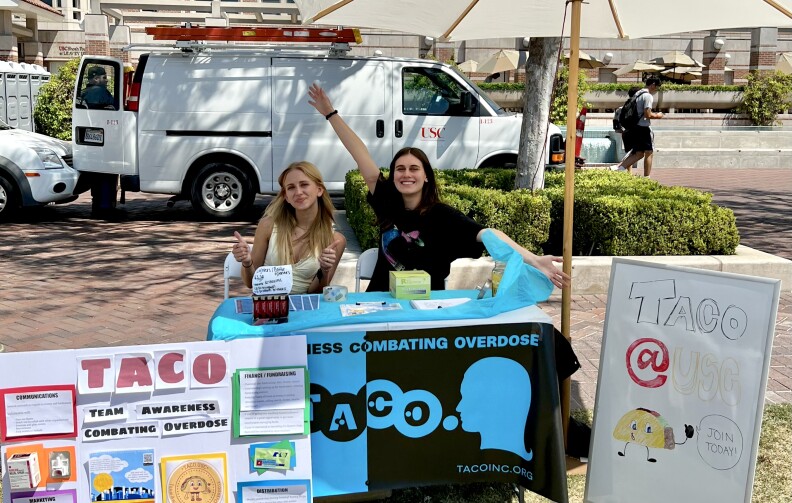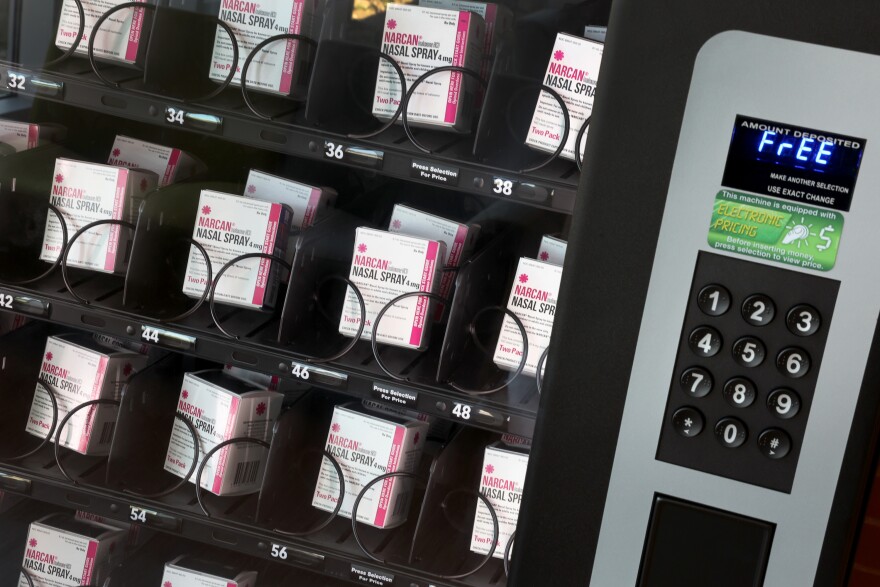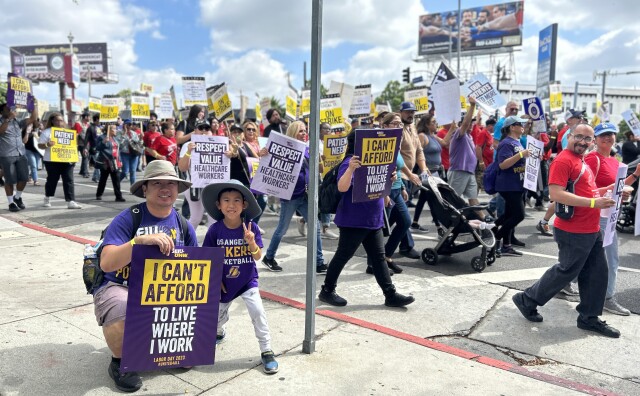A fentanyl overdose is a terrifying and painful experience. The skin turns cold and clammy, the pupils constrict. Breathing slows to a shallow crawl. The pulse weakens, and many people become unresponsive or lose consciousness.
“It almost makes the experience surreal, like it was a dream,” says B, a Los Angeles college student who overdosed on fentanyl after consuming cocaine laced with the substance. His full name is being withheld to protect his identity.
B says he woke up in an ambulance with double-vision and severe nausea. “It was absolutely awful,” he remembers. His story is an increasingly common one.
Los Angeles Is Experiencing A Crisis
Los Angeles is in the middle of the largest overdose crisis it’s ever seen. Fentanyl is a major culprit – in part, because of its presence in other drugs.
-
Nonprofit's launching fundraiser to keep it afloat
-
USC study documents what residents want from trees
-
What candidates can — and can't — say they do
According to the L.A. County Department of Public Health, accidental fentanyl overdose deaths increased nearly 1300% over a five year period, from 109 in 2016 to 1,504 in 2021.
Many people who consume fentanyl don’t intend to, and might not even know they are using it. It’s often used as a filler in things like cocaine, heroine or molly pills.
One of the only tactics proven to combat overdoses is this idea of harm reduction: a strategy to directly engage with people who are using drugs and offer what the Substance Abuse and Mental Health Services Administration calls “low-threshold options” for treatment.
That might involve handing people Narcan, which reverses the effects of overdoses, or test-strips so they can see what’s in the drugs they want to use and, hopefully, avoid serious illness or death.
Recent overdoses at schools in the L.A. Unified School District, including the death of a 15 year-old girl at Helen Bernstein High School, have finally given political traction to harm reduction in Los Angeles. LAUSD announced it will provide Narcan to every K-12 school in the district. And at the end of November, L.A. County District Attorney George Gascón announced that his office would join forces with LAUSD, law enforcement and the public health department to create of a fentanyl working group.But before LA County & City officials got involved, there was TACO.
Team Awareness Combatting Overdose

“Fentanyl isn't going away anytime soon, but the way we respond to it is what we can change,” says Isabella Gianatiempo. She’s the 22 year old co-founder and CEO of Team Awareness Combatting Overdose – TACO, for short. It’s a nonprofit that provides harm reduction resources and trainings to students.
Gianatiempo says she started TACO with four other neuroscience students at USC to fill an education gap.
“When we started, there were no educational resources available for students who wanted to learn about overdose prevention,” she says. So she and her peers stepped in.
The organization started in June of 2020, after one of the other co-founders lost a close friend and fellow student to overdose. Gianatiempo says within their first year, they brought the number of overdose deaths at USC, “from double digits to zero.”
After TACO’s success at USC, Gianatiempo and her co-founders took the organization national.They now operate as a nonprofit with chapters at universities across the country, from Oregon to Ohio.
During an overdose, TACO’s most important tool is Narcan, or naloxone. When administered quickly, it can reverse the effects of an overdose. That’s exactly what happened to B – a friend ran and grabbed Narcan that had been provided to him by TACO.
But Gianatiempo says it’s important to remember, “education is the most important tool.” She says having a few doses of Narcan buried in an emergency kit isn’t going to help you if you don’t know how to use it.
That’s why TACO is more than just free Narcan and test-strips.
They lead online and in-person trainings and provide other educational resources for highschools, college campuses, and rehabilitation centers across the country.
“We saw the value of breaking complex scientific literature down and educating our peers in a neutral, scientific way,” Gianatiempo says. She says they answer questions like: “What happens when certain drugs enter your body, how does it affect your metabolism, how does it affect your brain, what kinds of chemicals are released?”
Her goal, she says, isn’t to condemn or encourage drug use. “It's simply just making sure that people can make the best choices for themselves.”
‘Overdose Can Happen To Anyone’

TACO takes a “by students, for students” approach to harm reduction. Everyone in the organization is a college student or recent graduate.
Almost all of them were personally touched by fentanyl in some way.
Kala Shute, TACO’s 21 year-old chief communications officer, says her close friend and five other students from her highschool overdosed on fentanyl. William Macdonald, a sophomore student on the executive board of the USC chapter, passes out fentanyl test-strips every week.
Macdonald says when he was in highschool, his friends weren’t able to easily test their substances for fentanyl. He knew several people who overdosed after an accidental exposure.
“The second I heard about TACO,” Macdonald says, “I decided to join up with them and try and make my own impact on the community.”
Gianatiempo says it’s important to remember that “overdose can happen to anyone.” It could be people who use opioids daily, or it could be someone who is trying a pill or powder for the first time.
She says she’s proud that she and her friends were able to step in and help distribute life-saving solutions at a time when it felt like nobody else was. And she welcomes that L.A. County officials - and those within LAUSD - are taking steps to prevent more overdose deaths.
“I think that people realize the power of Narcan,” she says. “If they had this small nasal spray tucked away in a cabinet somewhere, their students could still be alive.”
She wishes it didn’t take teen overdose deaths to reach that point, “but the fact that these schools are now carrying it, training staff on how to recognize an overdose and what to do, is pretty incredible.”
To learn more about TACO and hear more of B’s story, check out the episode of How To LA.










